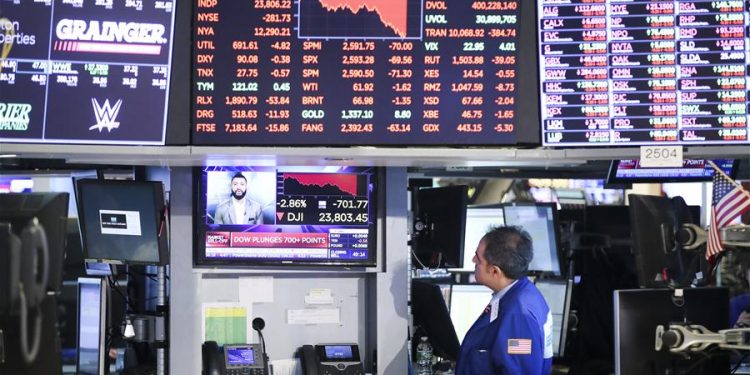New York: US stocks ended lower, wrapping up the week on a negative note, as Wall Street parsed a slew of mixed data, including those related to consumer spending and durable goods, which offered clues for investors to assess the health of the US economy.
The Dow Jones Industrial Average decreased 70.87 points, or 0.26 per cent, to 26,820.25. The S&P 500 dropped 15.83 points, or 0.53 per cent, to 2,961.79. The Nasdaq Composite Index decreased 91.03 points, or 1.13 per cent, to 7,939.63, news agency reported Friday.
Ten of the 11 primary S&P 500 sectors traded lower around market close, with the information technology sector down 1.41 per cent, leading the losers.
On the economic front, the index of consumer sentiment picked up to 93.2 in September as boosted by more favourable income trends, especially among middle-income households, the University of Michigan said Friday in its widely-watched survey.
Yet US consumers voiced concerns over rising levels of economic uncertainty, caused basically by partisanship, global economy and domestic economic policies, according to Richard Curtin, Surveys of Consumers chief economist of the university.
“Trade policies have had the greatest negative impact on consumers, with a near record one-third of all consumers negatively mentioning trade policies in September,” Curtin noted.
Personal income increased $73.5 billion, or 0.4 per cent, in August, reported Friday.
Personal consumption expenditures (PCE), a key metric of household spending, rose $20.1 billion, or 0.1 per cent, which involved increases in spending for goods, primarily for recreational goods and vehicles, as well as falls in spending for services, mainly for food services and accommodations.
New orders for manufactured durable goods in August climbed 0.2 per cent to $250.7 billion, marking the third consecutive monthly growth, the US Census Bureau said Friday.
Shipments of manufactured durable goods last month also increased 0.1 per cent to 254.2 billion dollars, following a 1.2 per cent decrease in July.
IANS






































